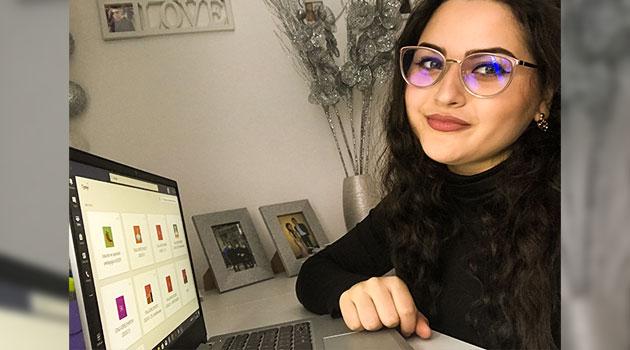During Czech COVID-19 pandemic, NGO distributes more than 80 laptops to Romani students for distance learning

“The students contacted us themselves, sometimes social workers or teachers reached out and gave us tips about families who actually need aid,” Štefan Balog, the coordinator of the ROMEA organization’s Romani Scholarship Program, recalled for Romani vod’i magazine when discussing the first wave of the pandemic in the Czech Republic. When, at the beginning of March, reports started appearing in the media of possible school closures, it was clear to him and his colleagues that a lack of computer technology would be problem number one in many Romani families.
The campaign they began to find computers for those students was not, however, limited just to their own scholarhip recipients with whom they already work in the program. They offered aid to all Romani schoolchildren and students unable to participate in distance learning for lack of equipment.
“At the same time, we know computers are lacking in non-Romani families too, of course. For that reason it’s brilliant that many similiarly-targeted campaigns and initiatives providing such aid across the board have also been launched. Thanks to our field experience and our contacts, however, we are able to assist Romani families who might have been ashamed to contact those big collection efforts, or who didn’t even know they existed, or who would not have known how to reach out to them,” scholarship program manager Jitka Votavová said.
Good people still exist
“Of our 90 scholarship recipients, 28 students contacted us about a lack of computer technology, 19 of them high school students and nine of them university students. So far we have managed to find more than 80 laptops. In the spring there were fewer requests, most probably because people hoped the school closures would not go beyond the end of the 2019/2020 school year,” Balog said.
During September and October, however, the demand for such aid exceeded what was available. Most of the computer technology was donated by individuals, including firms and organizations.
Among the donors were, for example, the Epistop association, which does advocacy about the subject of epilepsy, while tablets were supplied by the Olga Havel Foundation and the collaboration with the Česko Digital initiative was of great aid. “Donors in most cases are giving their own laptops or used ones from their firms. We are even finding people who are buying us new computers or refurbished ones. One gentleman, for example, sent us his two daughters’ older laptops, which were still functioning well, bought them new ones, and also bought four more refurbished, very high quality laptops for our students,” Balog said.
A longstanding private supporter of the Romani ScholarshipPprogram also joined the aid effort who, as an individual, offered no small amount of money for the cause but wanted to remain anonymous. “When he offered me CZK 200 000 [EUR 7 600] to acquire new laptops, I was slightly in shock at first. At the same time, though, I was greatly relieved, because the list of students who had reported their needs to us in this regard was growing daily, and I knew that this would be a lifesaver to them. It’s amazing that there are people among us who want to assist others selflessly. I’d like to thank him from the bottom of my heart for what he is doing for us,” Balog said.
Remaining offline
Even today, when few people are able to imagine their lives without a smartphone in their pocket and a computer, laptop or tablet on their desk, there are actually many pupils and students without such equipment all over the Czech Republic. “Thanks to our collaboration with social workers from a municipal department of Prague, for example, we found out about the situation of several Romani families who were not doing well at all in this regard. We were most affected by the story of a mother of four schoolchildren who is being treated for a brain tumor. We sent two computers to that family. It’s not absolutely ideal, because the children have to share them. Nevertheless, two computers for them and their mother represent a great relief and an opportunity to better and more easily prepare for school,” Votavová said.
The scholarship program manager encounters many Romani students in secondary schools who are dreaming of a future as a lawyer or police officer. In addition to a lack of belief in such a future coming from their home environments, loved ones, peers or teachers, they frequently come up against their own families’ limited resources, which cannot stretch to meet the needs of studying in secondary school and then university.
“We know that a significant portion of the students who are in contact with us through the scholarship program also have younger siblings in primary school with whom they have to share computers, if there are ones in the family, to prepare for school and attend classes online. One of the scholarship recipients to whom we gave a laptop is studying computer systems at a trade school. Until then his access to a computer had just been at school, he lives in an excluded locality and his father has multiple sclerosis. Their sole income is his disability pension. The laptop that was donated represents an enormous aid to him – and not just during distance learning, but it also will during the regular school regime to which we hopefully will soon return,” Votavová said.
According to the program manager, the students themselves greatly appreciate the aid. “For me, this is actually a big deal! It’s like a small miracle in my third year of university. It is making all my work easier and I will be able to study better. I am really very grateful. Thanks to this assistance I can be and I would like to be a motivater and role model to other children who don’t come from families where stuff like electronics or paying tuition is a matter of course,” a 23-year-old student named Michal told the program.
Let them buy it themselves
However, this initiative has not received just positive responses – the most frequent questions of disbelief that the organizers have encountered are mainly being asked about aid for Romani students in particular, doubting whether they are actually in situations where they need such assistance, usually phrased along the lines of: “They must have needed computers even before COVID, how can they suddenly not have any?” Balog describes their situation in more detail: “Before the introduction of the Government measures to suppress the pandemic, the public libraries were still open, computer labs at schools were still open, it was easier to visit schoolmates who have computers, etc. Today, a computer is considered standard student equipment. Until distance learning was ordered here, children and young people who simply do not have their own computers were ignored. That was in spite of the fact that, as various surveys are demonstrating, there are thousands of them.”
Other objections to donating include the idea that students are able to earn their own money to buy their own equipment during their studies. According to Balog, many students in the scholarship program have indeed worked part-time or on a temporary basis.
“With this crisis, however, many students lost their jobs. I dare say that we know a great deal about these students’ situations and family backgrounds, so we also know that many of them have given what they make from their temp work to keep their own households running, to put food on the table, or to contribute toward rent. Under those conditions, it absolutely is simply not within their power to save for a laptop. From the scholarships we provide them, which are CZK 14 000 [EUR 533] for the whole school year, they frequently spend quite a bit of that money on basic needs – commuting costs, paying for meal programs or tuition – not to buy computer technology,” Balog said.
Some Romani scholarship recipients, however, have better luck and the financial situation of their families is much better. They are not asking for aid with acquiring computers.
Why does your aid just go to Roma?
Why is this aid being targeted just to Romani students when many non-Romani students are also experiencing adversity? “That is a frequently asked question and a legitimate one, of course,” the program manager said.
“There are many reasons. However, in order to comprehend them, it is necessary to accept the fact that the Romani people living on the territory of the Czech Republic have experienced and are experiencing discrimination, for which there is evidence now and historically, in all areas of their lives,” Votavová said.
“We do our best, through this scholarship program, to compensate for the discrimination Romani people have experienced in accessing education, discrimination that has appeared, for example, in the disproportionate, absolutely unjustified assignments of Romani children into special needs education. During the previous regime, Romani children frequently ended up in special schools and ‘practical schools’ for children with mild mental disabilities, schools whose graduates have greatly limited opportunities for applying themselves on the labor market,” the program director said.
Such experiences, according to Votavová, are shared by many parents of the Romani scholarship recipients, who are supporting their children in achieving higher educations because they are strongly aware it means they will have a bigger chance at securing good employment as adults, although there is no guarantee of that – even educated Romani people still have problems finding fair housing or jobs for which they are qualified in the Czech Republic. “Moreover, even today there are segregated schools or classes in this country that are basically attended just by Romani children and the level of education in those schools is low, which predetermines their further career of study or profession,” Votavová said.
“We are doing our best, therefore, to aid those Romani students above all who come from impoverished conditions and whose matriculation into secondary school or university, or whose completion of those studies, is endangered by those conditions,” Votavová said. The scholarship program does also provide aid to Romani students who may be financially better off as long as they have excellent academic results, are active in their neighborhoods, and do their best to motivate their fellow students, whether non-Romani or Romani.
Aid from outside
There is very little doubt that children without access to distance learning will fall behind their classmates; moreover, there is the fear of other repercussions that are waiting just around the corner – students in their senior year of high school mainly have big concerns about passing examinations, but the situation is not easy for the very youngest pupils either. “For young children in lower primary school it is frequently essential that somebody sits with them during the online instruction, ideally a parent, to supervise whether all is functioning as it should, whether the microphone and camera are on, whether the child is concentrating and perceives the teacher,” Votavová is convinced.
“For families experiencing socioeconomic disadvantage, for families living in excluded localities where the parents themselves may have earned just a primary education, or for single-parent families, the danger is that they do not have what it takes to provide appropriate conditions for distance learning, no matter how much they want to,” the scholarship program manager said. She considers it essential that basic information be communicated to such families about what the schools can do for them and what external aid is available, including staffers of nonprofit organizations who may already have longstanding relationships with such families and may be able to offer them a helping hand in their difficult situations.
First published in Romano voďi magazine.
